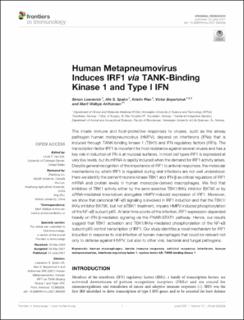| dc.contributor.author | Loevenich, Simon | |
| dc.contributor.author | Spahn, Alix Saskia | |
| dc.contributor.author | Rian, Kristin | |
| dc.contributor.author | Boyartchuk, Victor | |
| dc.contributor.author | Anthonsen, Marit Walbye | |
| dc.date.accessioned | 2021-08-31T07:46:03Z | |
| dc.date.available | 2021-08-31T07:46:03Z | |
| dc.date.created | 2021-08-06T17:56:51Z | |
| dc.date.issued | 2021 | |
| dc.identifier.citation | Frontiers in Immunology. 2021, 12, . | en_US |
| dc.identifier.issn | 1664-3224 | |
| dc.identifier.uri | https://hdl.handle.net/11250/2771848 | |
| dc.description.abstract | The innate immune and host-protective responses to viruses, such as the airway pathogen human metapneumovirus (HMPV), depend on interferons (IFNs) that is induced through TANK-binding kinase 1 (TBK1) and IFN regulatory factors (IRFs). The transcription factor IRF1 is important for host resistance against several viruses and has a key role in induction of IFN-λ at mucosal surfaces. In most cell types IRF1 is expressed at very low levels, but its mRNA is rapidly induced when the demand for IRF1 activity arises. Despite general recognition of the importance of IRF1 to antiviral responses, the molecular mechanisms by which IRF1 is regulated during viral infections are not well understood. Here we identify the serine/threonine kinase TBK1 and IFN-β as critical regulators of IRF1 mRNA and protein levels in human monocyte-derived macrophages. We find that inhibition of TBK1 activity either by the semi-selective TBK1/IKKε inhibitor BX795 or by siRNA-mediated knockdown abrogates HMPV-induced expression of IRF1. Moreover, we show that canonical NF-κB signaling is involved in IRF1 induction and that the TBK1/IKKε inhibitor BX795, but not siTBK1 treatment, impairs HMPV-induced phosphorylation of the NF-κB subunit p65. At later time-points of the infection, IRF1 expression depended heavily on IFN-β-mediated signaling via the IFNAR-STAT1 pathway. Hence, our results suggest that TBK1 activation and TBK1/IKKε-mediated phosphorylation of the NF-κB subunit p65 control transcription of IRF1. Our study identifies a novel mechanism for IRF1 induction in response to viral infection of human macrophages that could be relevant not only to defense against HMPV, but also to other viral, bacterial and fungal pathogens. | en_US |
| dc.language.iso | eng | en_US |
| dc.publisher | Frontiers Media | en_US |
| dc.rights | Navngivelse 4.0 Internasjonal | * |
| dc.rights.uri | http://creativecommons.org/licenses/by/4.0/deed.no | * |
| dc.title | Human Metapneumovirus Induces IRF1 via TANK-Binding Kinase 1 and Type I IFN | en_US |
| dc.type | Peer reviewed | en_US |
| dc.type | Journal article | en_US |
| dc.description.version | publishedVersion | en_US |
| dc.source.pagenumber | 14 | en_US |
| dc.source.volume | 12 | en_US |
| dc.source.journal | Frontiers in Immunology | en_US |
| dc.identifier.doi | 10.3389/fimmu.2021.563336 | |
| dc.identifier.cristin | 1924498 | |
| dc.description.localcode | Copyright © 2021 Loevenich, Spahn, Rian, Boyartchuk and Anthonsen. This is an open-access article distributed under the terms of the Creative Commons Attribution License (CC BY). The use, distribution or reproduction in other forums is permitted, provided the original author(s) and the copyright owner(s) are credited and that the original publication in this journal is cited, in accordance with accepted academic practice. No use, distribution or reproduction is permitted which does not comply with these terms. | en_US |
| cristin.ispublished | true | |
| cristin.fulltext | original | |
| cristin.qualitycode | 1 | |

